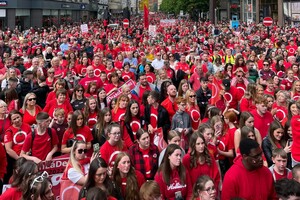A large-scale demonstration of ethnic Irish people took place in the British capital of Northern Ireland, Belfast.

As reported by “European Truth”, its organizers demanded an increase in the role and representation of the Irish language in official and public communication in the region.
The organizers of the protest, the community An Dream Dearg (“Red Dream”), estimated the number of demonstrators at 17,000 and called the rally “the largest in a generation.” The local newspaper Belfast Telegraph does not give an accurate estimate, but agrees that thousands of people were involved.
Its participants, all dressed in red, not only represented Belfast but also came from different parts of the Irish island.
Two years ago, as part of an agreement between local politicians and London, an agreement was signed to develop the Irish language, heritage and culture, but no legislation has been passed since then.
< p>“There can be no more delays, the Irish language community simply wants to be treated equally and with respect, and it can no longer be denied,” said Paul Doherty, a representative of the local center-left SDLP party.
< Northern Ireland has recently caused tensions between London and Brussels: Britain is again demanding a revision of the "Irish" part of the agreement on Brexit .
The functioning of the border on the island of Ireland was initially one of the most difficult issues in the Brexit negotiations. The decision on the transparency of the border between the EU member state and Northern Ireland – part of Britain, caused logistical problems and left dissatisfied with the Unionists, who see this as an encroachment on the region's membership in the United Kingdom.
Read also: Brexit finally left the EU
The 1998 Belize Accords recognized Irish and Ulster-Scottish as the official languages of the region. In 1999, two Irish and Ulster-Scottish language support agencies were set up to assist in the study of these languages in schools and optional language centers. In 2003, the British and Irish governments jointly expressed their commitment to the principles set out in the Northern Ireland Act 1998 and announced the establishment of government agencies to implement the program.
The conflict in Northern Ireland was sparked by a dispute between British authorities and local national organizations on the status of the region. The main force opposing Britain was the Irish Republican Army (IRA). In turn, the main opponent of the IRA was the Protestant Order of Orangeists and the radical right-wing Protestant organizations that supported it. During the confrontation in Northern Ireland, 3,524 people were killed on both sides, including 1,857 civilians. The formal end to the conflict is April 10, 1998, the day the Belfast Agreement was signed.




